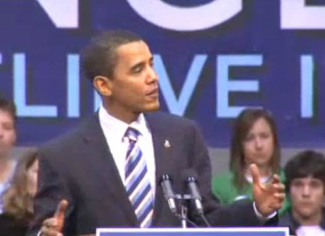 Obama urges Americans to move beyond issues of race. Obama urges Americans to move beyond issues of race. Tags: nationalism, race/ethnicity, theory, color-blindness, ideology, obama, 06 to 10 mins Year: 2008 Length: 6:14 Access: YouTube Summary: Racial ideologies are race-based frameworks for understanding the social world, which either challenge or reinforce the status quo of white privilege. In his book, Racism Without Racists (2013), Bonilla-Silva argues the dominant ideology of today is color-blindness, which views race as no longer important to determining social outcomes and, that by discussing race, we are treating it as if it is a real thing. As a result, we should move beyond race by ignoring it and being color-blind. The problem is that race does continue to shape social outcomes (e.g. in the labor market, wealth, education, interactions with police, and everyday encounters), and by ignoring this--or by being colorblind--we help perpetuate and reinforce the system of racial inequality. The power of this ideology is reflected in this early speech by Obama in March 2008. The speech came after the controversy of Jeremiah Wright, Obama's pastor whose racial remarks became highly scrutinized in national media. In the video here, Obama is encouraging viewers to ignore the issue of race and unite as Americans--to "move beyond these kinds of divisions." In short, he is promoting a color-blind society united through national identity. This is especially interesting in the context of Bonilla-Silva's book because in it, he predicts the future of race relations in the US by drawing upon the examples of Latin America. Amongst other factors, he notes that white supremacy in Latin American (e.g. Brazil) has been maintained through the myth of national unity, which claims that these countries have moved beyond racial divides and are united through national identity. In this speech, Obama makes similar calls to "bring the country together" as "Americans"; he states that "there is no Black America or white America, Asian America, Latino America; there is the United States of America" to great applause from the audience. In the book (Chapter 10), Bonilla-Silva notes the absence of gains made by Obama in regards to race, a topic that is not targeted in his social policies and is almost never addressed publicly (for an important exception, see his comments following the death of Trayvon Martin). In sum, Obama's speech is ideological because it helps to reinforce the system of white privilege; only by examining and discussing racial inequality can we begin to move beyond it. Submitted By: Paul Dean
1 Comment
Manuel Franco
7/29/2023 02:22:29 am
I just want to say Thank You to everyone who supported me through the years. My name is Manuel Franco, New Berlin, Wisconsin. My story of how I won the Powerball lottery of $768.4M is a bit of a tale. I have been playing Powerball tickets for 6 years now since I turned 18. I bought my first ticket on my 18 birthday. I was feeling very lucky that day because I had contacted Dr. Odunga Michael to help me with the winning Powerball numbers. I really had that great great feeling that I looked at the camera wanting to wink at it. I only did a tiny part of it and trusted him. He gave me the numbers after I played a couple other tickets along with it for $10. I checked my ticket after the winnings came online and saw the numbers were correct including the Power play. I screamed for about 10 minutes because it felt like a dream. I had won $768.4M. You can check my winning testimony with the lottery officials just with my name search. Thank you Dr Odunga. Well, his email is [email protected] and you can also call or Whats-app him at +2348167159012 so you guys can contact him
Reply
Leave a Reply. |
Tags
All
.
Got any videos?
Are you finding useful videos for your classes? Do you have good videos you use in your own classes? Please consider submitting your videos here and helping us build our database!
|
 RSS Feed
RSS Feed
